Fingal Local Studies & Archives
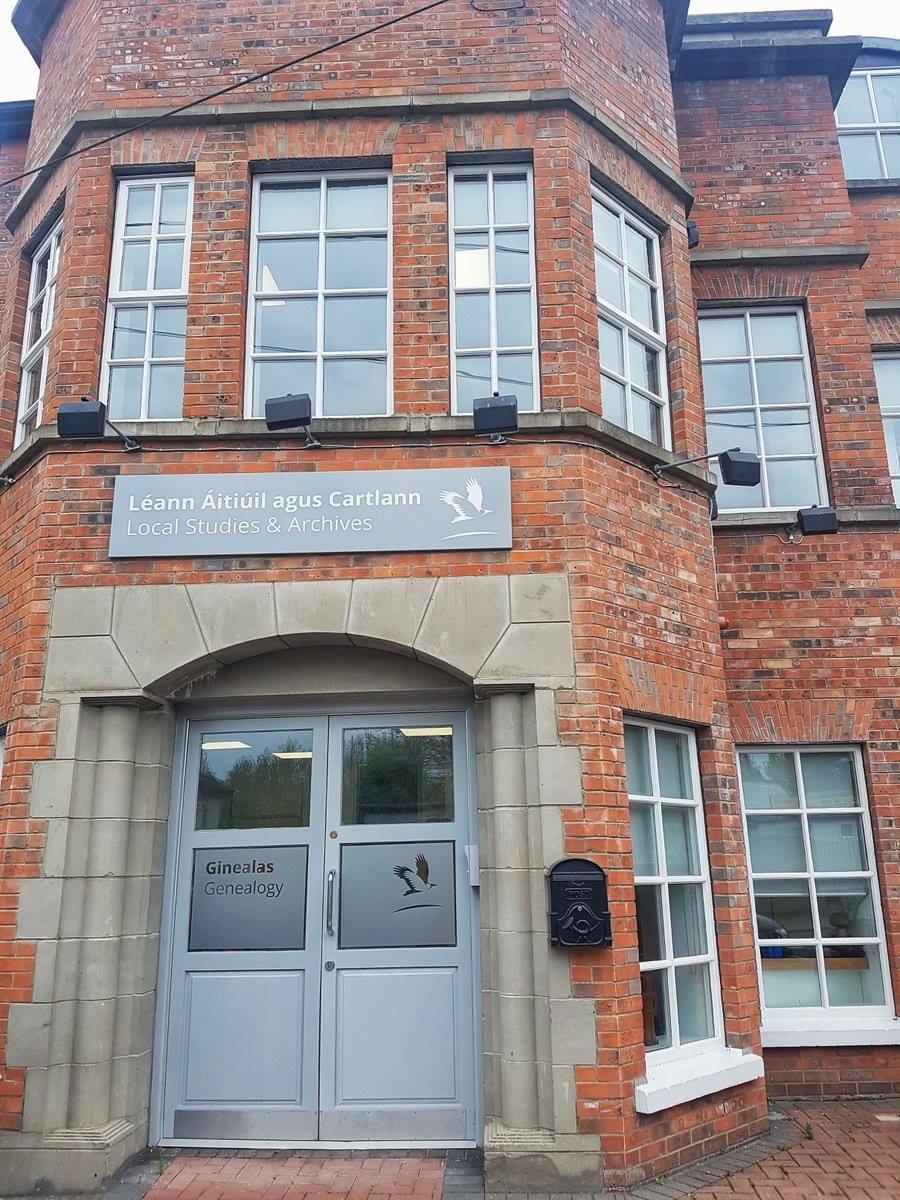
Collecting, preserving and making available historic records
What do we do?
Fingal Local Studies & Archives collect, preserve and make available historic records relating to Fingal and Dublin generally. We acquire records by transfer, donation and purchase. We also undertake outreach including exhibitions, publications, talks, the Fingal Festival of History, Fingal Studies and participation in Heritage Week and Culture Night.
Who is it for?
Our friendly and efficient service is available to anyone interested in local, social or family history. All researchers are welcome whether professional, amateur, student, groups, classes etc. Queries are also welcome by phone, post or e-mail.
What do we have?
The Local Studies collections are an important resource for the study of local history in Fingal and Dublin generally. We hold collections of photographs, postcards, maps and artwork depicting various places throughout the county. Additionally, there is an extensive printed collection of local history books and periodicals, reference works and general genealogical and historical books. New publications are added regularly. We also hold the only hardcopy version of the Fingal Independent from Jan 1994 – Oct 2022. A large collection of 300+ directories and almanacks dating from 1752-2012 provides a rich source of information on businesses, traders, merchants, institutions, government bodies, organisations and prominent citizens. Finally, there is an ephemera collection comprising military medals, tram tickets, posters etc. Much of the Local Studies collections can be searched on the Spydus catalogue by selecting ‘Fingal Local Studies & Archives’ as the location.
The Archives contains records of local government in County Dublin from 1775 to the present day alongside private, family and estate papers. At present, work is underway on the creation of an online archival catalogue. In the meantime, any queries on our holdings are welcome.
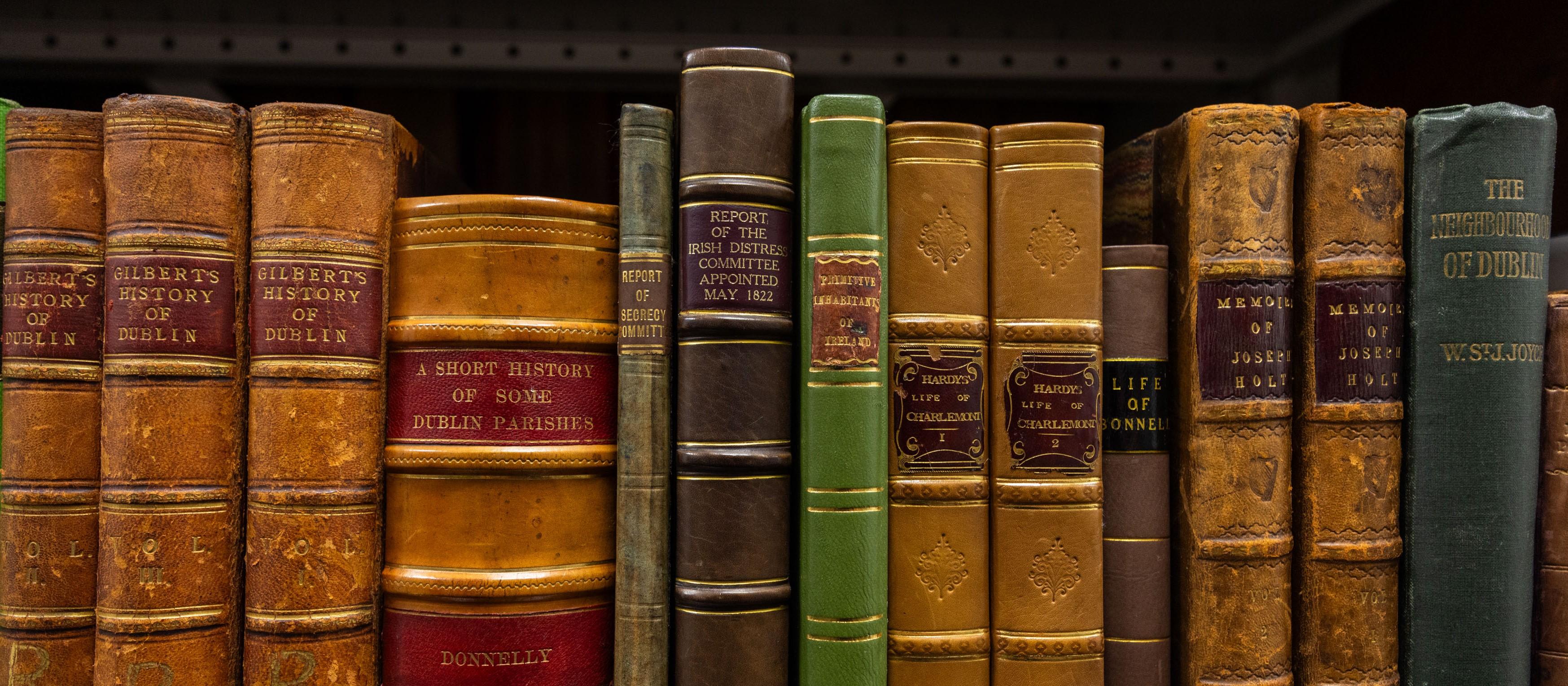
Our collections include:
TURNPIKE TRUSTS (1775-1938) – records of early toll roads including Dublin to Dunleer, Dublin to Malahide, Dublin to Mullingar, Dublin to Carlow, Dublin to Knocksedan, Dublin to Ashbourne and Dublin to Navan.
HOWTH HARBOUR COLLECTION (1809-1822) – Small collection of correspondence relating to the construction of Howth Harbour including letters from John Rennie and John Rennie Jnr, the engineers on the project.
COUNTY OF DUBLIN GRAND JURY (1818-1919) – 189 volumes of Minutes, Baronial Presentments, Grand Jury Presentments, Abstracts of Presentments and Abstracts of Proposals. These typeset volumes largely record decisions made about infrastructural projects throughout the county (i.e. both North & South Dublin). Baronies covered include: Uppercross, Nethercross, Newcastle, Balrothery, Rathdown, Castleknock, Coolock and occasional references to Dublin City. For further information on Grand Juries in Ireland see the publication from the TCD Virtual Treasury project - People, Place and Power – The Grand Jury System in Ireland.
POOR LAW UNIONS/BOARDS OF GUARDIANS (1839-1923) – Including a small number of minute books from Balrothery Union, North Dublin Union and South Dublin Union.
RURAL DISTRICT COUNCILS (1899-1930) – Including 75 minute books from Balrothery RDC, Celbridge RDC, North Dublin RDC, South Dublin RDC and Rathdown RDC. This collection also includes Labourer’s Cottages Act Ledgers 1884-1942 detailing cottages built in Balrothery, North Dublin, South Dublin, Rathdown and Celbridge. These volumes contain information on the original owner of the lands bought for the purpose of building Labourer's Cottages, the amount of compensation paid, the location of the lands and their size in acres, roods and perches. They then record the names of the various contractors who worked on the construction of the cottages, and sometimes the first residents.
DUBLIN BOARD OF PUBLIC HEALTH (1930-1942) – Includes minute books and agenda books. Additionally, the Dublin Board of Public Health Housing Collection comprises a large number of proposed designs for housing throughout Dublin County (North and South) submitted to the Board, 1925-1940.
COUNTY DUBLIN BOARDS OF ASSISTANCE (1931-1960) – Very incomplete. Includes small number of minute and agenda books for the Balrothery and Rathdown Boards of Assistance. This collection contains personal information of a sensitive nature and is subject to access restrictions under GDPR legislation.
HOWTH URBAN DISTRICT COUNCIL (1917-1942) – Includes minute books, correspondence, and agenda books.
BALBRIGGAN TOWN COMMISSIONERS (1860-2009) – Includes minute books, managers’ orders, financial ledgers, drawings and plans. The minute books from 1860-2010 are digitised and available at https://btc.informa.ie/menu
DUBLIN COUNTY COUNCIL (1899-1994) – Includes minutes of the County Council and its various committees (financial, housing, local area etc), rate and valuation books.
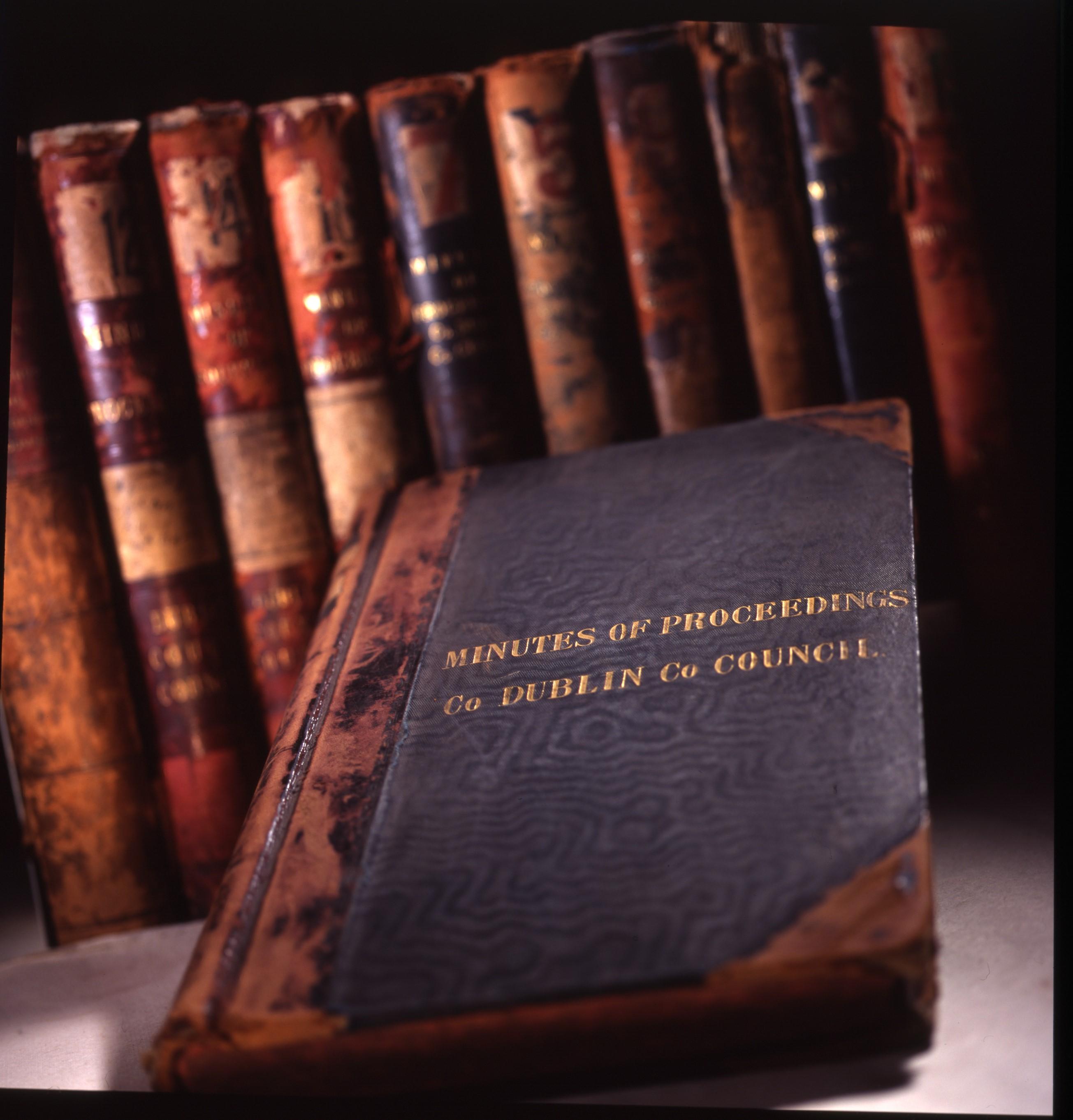
PRIVATE COLLECTIONS – Includes Hely-Hutchinson Papers, Hamilton Papers, Hone Papers, Earl of Fingall Papers, Cuffe Estate Papers, Butler Estate Papers, Westphalstown Deeds, amongst others.
TALBOT PAPERS – The archive of the Talbot family is held at the Bodleian Library in Oxford. Fingal Local Studies & Archives bought digital reproductions of several files from the Bodleian which can be viewed by appointment. The reproductions relate to the Malahide Estate and includes estate leases (1772-1862), rentals & accounts (1874-1919), letters from the agent for their Irish estates (1845-1882), correspondence, deeds, maps and plans. See a full listing here.
PLANNING FILES for Dublin County Council and Fingal County Council are not held by the Archives and are available from the Fingal Planning Department by contacting <span>[email protected] or (01) 8905541.
How can I make a donation?
Fingal Local Studies & Archives have been the recipient of many generous donations which have allowed us to expand our collections to the benefit of researchers both now and into the future. Donating material of enduring value to an archive means that these items are preserved for future generations and that they become part of the community’s collective memory. We welcome donations of material relating to Fingal and Dublin generally.
All potential donations are appraised by the Archivist and a donation agreement is made with the donor. See an example of our Archives Donation Agreement for further information. The terms and conditions of the Donation Agreement can be amended if required, in consultation with the Archivist. Contact span>[email protected] for further information.
We will also gladly accept digital versions of theses and dissertations pertaining to Fingal or Fingallians to add to our Local Studies collections.
How can I arrange a visit?
Researchers are very much encouraged to use and visit Fingal Local Studies & Archives. As many of our collections are stored offsite, we usually ask researchers to make an appointment in advance. We are currently open Monday-Friday, 10am-1pm and 2pm-5pm.
Please e-mail <span>[email protected] or <span>[email protected] to make an appointment.
We will provide every assistance to identify records that will be of interest to you in your research but staff cannot undertake research on your behalf. The material in our branch is for reference only and cannot be borrowed.
Researchers are welcome to take photographs without flash when consulting collections.
Is it accessible?
The Local Studies & Archives Reading Room is located on the ground floor of our building and is fully wheelchair accessible with an accessible bathroom.
We are an Age Friendly Library.
Contact:
Fingal Local Studies & Archives, 46 North Street, Swords, Co. Dublin, K67 F6Y3.
Karen de Lacey, Archivist and Catherine Keane, Senior Librarian.
E-mail: <span>[email protected] or [email protected]
Phone: (01) 8704486
Stay in touch! Join our newsletter mailing list
If you would like to receive the Fingal Local Studies & Archives newsletter with details of events, projects, new collections etc, please click here to sign up.
Fingal Studies Journal
Fingal Studies is an annual local history journal dedicated to recording and uncovering the history of Fingal, from the earliest times to the present day. Originally published from 2010 to 2015, it was re-launched as an annual journal in October 2024. The new issues are available in print through Fingal Library branches and also as eBooks on BorrowBox. The journal is produced by Fingal Local Studies & Archives. For further information, click here.
Fingal Festival of History
Our main outreach event is the annual Fingal Festival of History which takes place each October. Talks on a variety of historical topics are held in Fingal library branches with one full-day of talks at a venue in Fingal. Details of upcoming events can be found here.
Some talks from previous festivals were recorded and can be viewed on the Fingal Libraries YouTube channel. See below for further details:
Fingal Festival of History Recorded Talks 2024
Fingal Festival of History Recorded Talk 2023
Fingal Festival of History Recorded Talks 2022
Fingal Festival of History Recorded Talks 2021
Fingal Festival of History Recorded Talks 2020
Are any records available online?
We are beginning a digitisation programme and have placed some of our digitised material on the Digital Repository of Ireland website which will be updated as the project continues. At present, work is underway on the creation of an online archival catalogue which will eventually host much of our digitised material.
To celebrate 150 years of the Balbriggan Town Commissioners, the minute books from 1860-2010 were digitised and placed online at btc.informa.ie.
Additionally, Buried in Fingal hosts a database and digitised copies of the existing burial registers for cemeteries in the care of Fingal County Council up to the year 2013. Click here for details of what records are available for each cemetery.
What e-resources are available?
While in our branch, you can use the following online resources:
- Find My Past
- Irish Newspaper Archives
- British Newspaper Archives
- The (London) Times Digital Archive
- JSTOR
- Family Search
- The Oxford Dictionary of Family Names of Ireland
This is in addition to free-to-access resources such as irishgenealogy.ie, census records, NLI parish records, Griffith’s Valuation, Tithe Applotment Books etc.
We hold Volumes 3-10 of Memorials of the Dead, a series consisting of surveys of headstones in various Dublin cemeteries undertaken in the 1990s by Dr Michael J.S. Egan. Click here for details of what cemeteries are covered by the volumes. We also hold copies of the Journal of the Society for the Preservation of the Memorials of the Dead in Ireland.
Our website Buried in Fingal hosts a database and digitised copies of the existing burial registers for cemeteries in the care of Fingal County Council up to the year 2013. Click here for details of what records are available for each cemetery.
History of Fingal Local Studies & Archives
In 1990, Dublin County Council established an Archives Division and hired their first professional Archivist. When Dublin County Council was disbanded in 1993 under the Local Government Act and replaced by the three new councils of Fingal, South Dublin and Dún Laoghaire Rathdown, it was decided that Fingal would be responsible for all the existing archival material. The Archives were originally based at the former Dublin County Council headquarters at 11 Parnell Square, moving in 2009 to Clonmel House in Swords and in 2019, to the present location of 46 North Street, Swords.
The Local Studies Department of Fingal County Council was set up in 1994 to encourage and facilitate the study of history and society in the new county. It was also based at 11 Parnell Square and moved to Swords with the Archives Department in 2009 to become a shared service. Fingal Local Studies & Archives are due to move once more to the new Swords Cultural Centre, on its completion.
Exhibitions and publications
The majority of our recent exhibitions and publications were created as part of our work on the Commemorations Sub-Committee of Creative Fingal and were supported by funding from Creative Ireland and the Decade of Centenaries through the Department of Tourism, Culture, Arts, Gaeltacht, Sport and Media.
Links to previous exhibitions, publications and videos are available below.
In 1875, the sale of the estate of George Alexander Hamilton took place at the Landed Estates Court on Inns Quay, Dublin. George Alexander was the 4th generation of the Hamilton family to reside in Balbriggan. His great grandfather Alexander settled in the area in the early 18th century. From that time, the family invested considerable funds in developing the town’s infrastructure and soon established thriving textile and maritime industries.
The estate was divided into 22 lots and included the entire town of Balbriggan itself. The sale is of particular historic significance due to the transfer of ownership of the town from the Hamilton family to a new entrepreneurial class. This exhibition by Brian Kavanagh looks at the auction that became known as ‘The Sale of Balbriggan’ and includes maps of the various lots from the estate catalogue. Fingal Local Studies & Archives wishes to acknowledge the assistance of the Balbriggan and District Historical Society in creating this exhibition.
The exhibition was on view at Bremore Castle during Heritage Week 2025.
2023 – Politics, War and Revolution: a timeline of Fingal History, 1912-1923
In October 2023, Fingal Local Studies & Archives published a book entitled Politics, War and Revolution: a timeline of Fingal History 1912-1923 by Dr. Bernard Kelly and Karen de Lacey. This publication also had an accompanying exhibition which went on display in Fingal Library branches throughout 2024. These projects were intended to mark the final chapter in the Decade of Centenaries and indeed the culmination of research carried out throughout the period by Fingal Local Studies & Archives and the Fingal Research Historian, Dr. Bernard Kelly. The publication and exhibition were launched in County Hall, Swords on November 8th, 2023. As part of the commemoration, Fingal Arts commissioned local artist Sophie Daly to create a new art piece based on the research carried out. More can be read about the resulting work ‘Turning of the Tithe’ below.
News item about book and exhibition.
Book - Politics, War and Revolution: a timeline of Fingal history 1912-1923. This publication is available on BorrowBox throughout the country. Hard copies are available free through Fingal library branches.
Exhibition PDF - Fingal 1900-1923, Politics, War and Revolution (English)
Taispeántas PDF - Fine Gall 1900–1923: Polaitíocht, Cogadh agus Réabhlóid (Gaeilge)
2022 – Trams to the Hill of Howth
From 1901, this feat of engineering opened up the scenic views of the Howth peninsula to thousands of tourists and cemented Howth’s place as a favoured seaside resort for generations of Dubliners. Closed in 1959, it is still affectionately remembered by many today.
Fingal Local Studies & Archives produced an exhibition and video exploring the history of the Hill of Howth tram which was on display in various branch libraries during 2022. The exhibition covered early transport and trams in Dublin City, the building and opening of the Howth tram line in 1901, tourism in Howth and the closure of the line in 1959. It also included a map of each stop on the line with information. The exhibition also utilised the many postcards, tickets and other items held by Fingal Local Studies & Archives and can be viewed below.
News item about the exhibition
Exhibition PDF - Trams to the Hill of Howth (English)
Video on YouTube - Trams to the Hill of Howth (English)
Talk by Siobhán Osgood on the architecture of the Great Northern Railway (YouTube)
Taispeántas PDF - Tramanna go dtí Cnoc Bhinn Éadair (Gaeilge)
Físeánon ar YouTube - Tramanna go dtí Cnoc Bhinn Éadair (Gaeilge)
2022 – A Dangerous Man: Frank Lawless and the War of Independence in Fingal
Frank Lawless was one of the most dynamic regional leaders of the revolutionary period. Born into a farming family in Swords, county Dublin in 1870, he followed his grandfather and father into nationalist politics, before becoming central to the republican movement in north county Dublin. Although most of his political life was spent in prison, as a result of his prominence in the 1916 Rising, it was cut short with his untimely death on 16th April 1922 after a road accident.
The exhibition A Dangerous Man: Frank Lawless and the War of Independence in Fingal, created by Fingal Research Historian Dr. Bernard Kelly, gives an insight into his life and politics along with the legacy he left. The exhibition examines the role he played in the cultural, political and sporting life of Fingal from his early years to his death. It was launched in County Hall, Swords on 25th April, 2022. As part of the commemoration, Fingal Arts commissioned a film by broadcaster and filmmaker Donal Dineen which can be viewed on YouTube (link below).
News item about the exhibition
Exhibition PDF – A Dangerous Man: Frank Lawless and the War of Independence in Fingal (English)
Taispeántas PDF – Fear Contúirteach: Frank Lawless agus Cogadhna Saoirse i bhFine Gall (Gaeilge)
Film on YouTube – Peace to the Ashes by Donal Dineen
2021 – The Burning of Fingal Coast Guard Stations, 18 June 1921
At the stroke of midnight on 18th June 1921, six Coast Guard stations on the North Dublin coast were silently approached by groups of IRA Men ready to undertake a simultaneous attack. The reason for these attacks was to secure a landing place for a shipment of arms which were being smuggled from the U.S. aboard the freighter East Side. It had been meticulously planned – the raiding parties lay in wait having cut the telephone wires to ensure no one could raise the alarm. When zero hour arrived, they rushed into stations up and down the coast, taking the Coast Guards by surprise. The Guards and their families, who lived onsite, were told to leave immediately and the stations were set alight. As dawn broke the following morning, flames were still licking what was left of the stations at Skerries, Loughshinny, Rush, Rogerstown, Portrane and Robswall.
Fingal Local Studies & Archives produced an exhibition about the event which was displayed in various branch libraries throughout summer 2021. The Fingal Arts Department, in association with the Irish Writers Centre, commissioned ‘A Burning Tide’ - six pieces of new writing on the theme of the Burning of the Coast Guard buildings in a reimagining and personal interpretation of the events.
News item about the exhibition
Exhibition PDF – Burning of Fingal Coast Guard Stations (English)
Taispeántas PDF - Stáisiún Garda Cósta Fhine Gall á nDó (Gaeilge)
2020 – Sack of Balbriggan
On the night of September 20th 1920, an event happened which would bring the attention of the world to the town of Balbriggan in North County Dublin. RIC Constable Peter Burke and his brother were in Smyth’s pub on Drogheda Street in Balbriggan when an altercation took place with a number of locals. The exact circumstances are unclear, but when the brothers left the pub at around 11pm they were shot by Michael Rock, a Fingal Brigade volunteer, leaving Peter Burke dead and his brother seriously injured. In retaliation, a convoy of trucks filled with troops from the nearby Gormanstown Barracks arrived to Balbriggan and began to loot and set buildings alight. Two local men, Seamus Lawless and Sean Gibbons were dragged from their homes and taken to the RIC Barracks on Bridge Street for questioning. The following morning, their bodies were found lying on the corner of Bridge Street and Quay Street. The Freeman’s Journal described it as “a town in a war zone” and it was reported on internationally.
To coincide with the centenary, the exhibition was shown at County Hall, Swords in September 2020.
News item about the exhibition
2019 – Celebrating the history of Irish Local Government
To mark 120 years of democratic local government in Ireland, the Local Government Archivists and Records Managers Group (LGARM), with support from the Department of Housing, Planning and Local Government, created an exhibition detailing the history of local government in Ireland from Grand Juries and District Councils to the foundation of County Councils in 1899. Topics such as voting rights and women in local government were also covered.
Exhibition PDF – Celebrating the history of Irish Local Government (English and Gaeilge)
2018 - Richard Coleman Centenary
2018 saw the centenary of the death of Richard Coleman, a company Captain of the Fingal (5th) Battalion. Coleman was born in 1890 on Main Street in Swords and came from a patriotic family who were members of the local Gaelic League. During the 1916 Rising, Coleman and twenty men from Lusk and Swords went to Dublin City, first proceeding to the GPO and then to the Mendicity Institute. Coleman was later sentenced to death but this was later commuted to penal servitude and he was imprisoned in Lewes Prison in Kent. Released in 1917, he would later be re-interned in Mountjoy where his friend Thomas Ashe would die during a hunger strike. Following a further re-arrest in 1918, Coleman was one of a number of prisoners to fall ill with influenza at Usk Prison, Wales. He sickened further and died on 9th December 1918. His funeral was attended by over 15,000 mourners who processed after the coffin to his final resting place in Glasnevin Cemetery.
Fingal Local Studies & Archives marked the centenary with an exhibition in County Hall, Swords in December 2018.
Exhibition PDF – Richard Coleman / Risteard Ó Colmáin (English/Gaeilge)
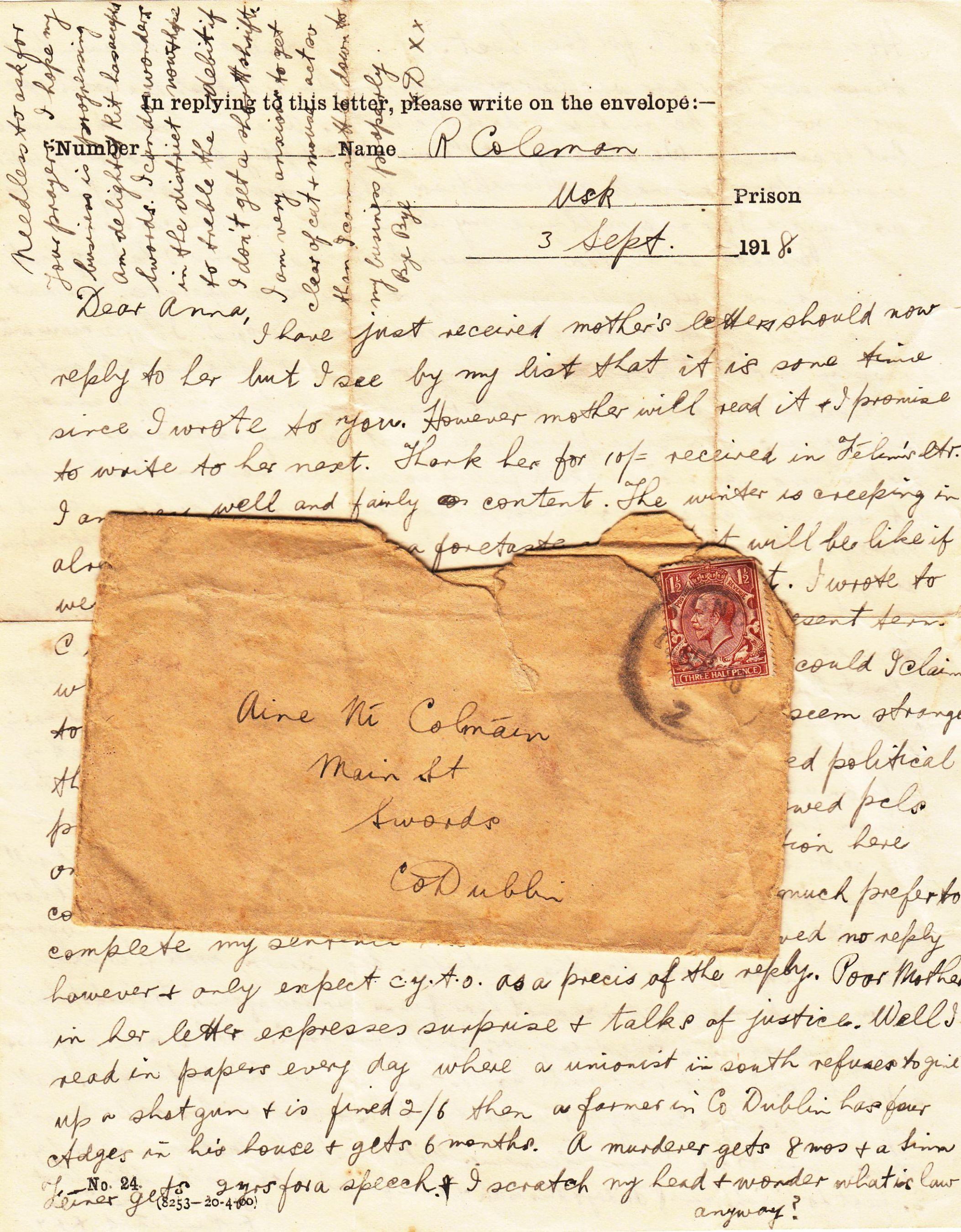
2017 – Thomas Ashe Centenary
2017 marked the centenary of the death of Thomas Ashe, Commander of the Fingal (5th) Battalion at the Battle of Ashbourne, Kerry man and Principal at Corduff National School, Lusk. Jailed after the Easter Rising, he was released in the general amnesty in June 1917 but re-arrested within eight weeks. In Mountjoy, he was among a group of prisoners who initiated a hunger strike on 20 September 1917. He became ill and died after forced feeding five days later leading to an outpouring of emotion across the country.
This exhibition was originally shown in County Hall, Swords in September 2017 with an additional display of original photographs, correspondence and artefacts.
Exhibition PDF – Thomas Ashe / Tomás Ághas (English/Gaeilge)
2016 – Fingal and the Fight for Irish Freedom
The Fingal and the Fight for Irish Freedom exhibition also included a display of items loaned by families of Fingallians involved in 1916 as well as objects on loan from Kilmainham Jail and Cork Municipal Museum. Part of Fingal’s Centenary Programme, it was launched by David O’Connor, then Mayor of Fingal, in County Hall, Swords in May 2016.
Exhibition – Fingal and the Fight for Irish Freedom (English)
2016 - Fingal and the 1916 Rising
A map and booklet were produced for the centenary of the Rising entitled Fingal and the 1916 Rising which includes information on the Irish Volunteer Companies that formed the Fingal 5th Battalion, the Irish Citizen Army unit from Baldoyle, sites which saw action in 1916, the location of camps during the Rising and other places in Fingal with a 1916 link.
Booklet – Fingal and the 1916 Rising (English)
Map – Fingal and the 1916 Rising (English)
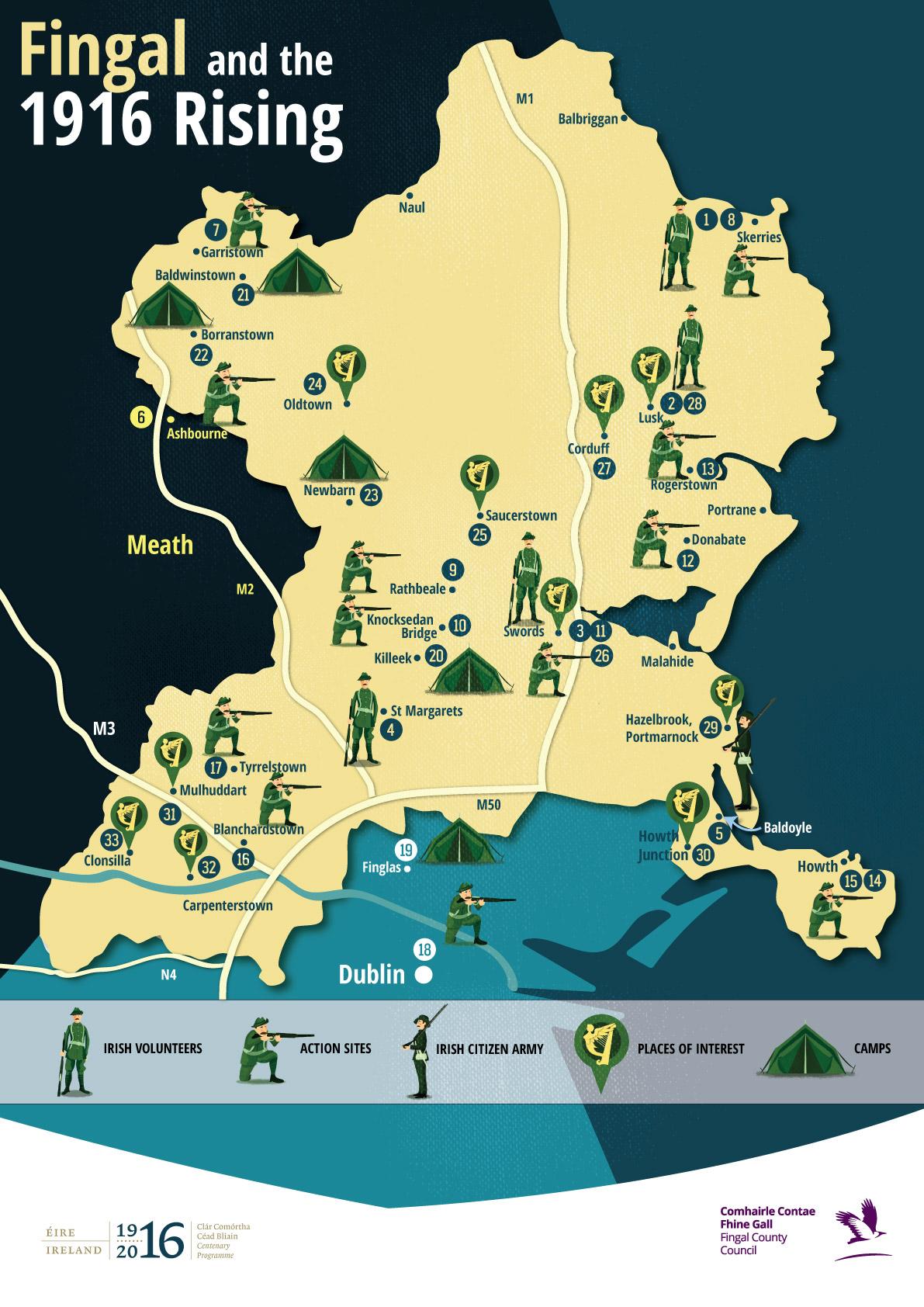
2010 – The Hely Hutchinsons of Swords
This exhibition looks at the Hely Hutchinson family, whose papers were donated to Fingal Local Studies & Archives in 2009 by Caroline Harlow and Fiona Selway, the last remaining members of the Hely Hutchinsons. The family was a branch of the Earls of Donoughmore of Knocklofty and later Palmerstown. Three families, Hatch, Synge, and Hely-Hutchinson, became intertwined through marriage in the late 18th and early 19th centuries. In 1834, a considerable portion of the Hatch family fortune came with Sophia Synge Hutchinson when she married a cousin, the Hon. Coote Hely-Hutchinson, a naval captain from Chapelizod. They went to live at Lissen Hall, the Hatch family seat in Swords. This was the beginning of the Hely Hutchinson family that was to make a notable impact on north county Dublin, especially in the areas of Donabate and Swords. They went on to own some 700 acres on the north bank of the Broadmeadow Estuary, centred around two substantial homes, Lissen Hall and Seafield House.
This exhibition was held in August 2010 at Fingal Local Studies & Archives in Swords. The exhibition gives information on the family and their homes at Seafield House, Lissen Hall, Nethercross House, Newport House and Meudon. It was accompanied by a display of original letters and photographs from the collection.
2008 – Local Government Elections in Ireland.
This exhibition examines the history of Local Elections in Ireland and was launched on 3rd November 2008 in County Hall, Swords by then Minister for Environment, Heritage and Local Government, John Gormley T.D. This exhibition was jointly produced by the members of what is now known as LGARM (Local Government Archivists & Records Managers). It looks at the history of local government in Ireland, the first local elections in 1899, the franchise, voter turnout and a general overview of local elections throughout the 20th century.
Exhibition PDF – Local Government Elections in Ireland (English)
2008 – The Building of Howth Steam Packet Harbour, 1808-1818. This exhibition, created with assistance from Ruth Lawler, traces the building of Howth’s Steam Packet Harbour following a request by the Directors General of Inland Navigation for a refuge harbour near Dublin port. The exhibition was launched for the bicentenary of the commencement of the work on the harbour and was exhibited in County Hall, Swords during Heritage Week 2008 with a display of related items. The exhibition was also shown at the Tourist Office in Howth.
Exhibition PDF - The Building of Howth Steam Packet Harbour, 1808-1818 (English)